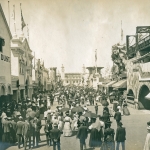Description
Clippings from the Congressional Record on the Lewis and Clark Exposition held in Portland, Oregon in 1905.
Related content
Collections with this item
Details
Transcription
CONGRESSIONAL RECORD—HOUSE.
March 29,
lewis and clark exposition.
Mr TAWNEY. Mr. Speaker, I ask unanimous consent for the present consideration of the following resolntion, which I shall send to the desk and ask to have read.
The Clerk read as follows:
Resolved. That during the remainder of this session the hill (S. 276) entitled "An act to provide for the celebration of the one hundredth anniversary of the exploration of the Oregon country." etc., shall have the privilege of bills reported from committees having leave to report at any time.
The SPEAKER. Is there objection to the present consideration of the resolution. .
Mr. ROBINSON of Indiana. Mr. Speaker I reserve the right
*°Mr!eRODEY. Mr. Speaker, I would like to ask the gentleman
if that cuts out the privileged report-
Mr TAWNEY. It does not cut out a privileged report and does not affect the privilege of any other bill. The Committee on Industrial Arts and Expositions has stricken out of the Senate bill all after the enacting clause, and has reported a bill to the House which provides simply for governmental participation in the ex-
position which is to be held in Oregon next year for the purpose
of commemorating this event. It is merely for governmental participation. It does not authorize the exposition, it does not appoint a commission, it does not invite foreign governments, but is simply such participation as the Government has heretofore taken in the matter of expositions authorized by the States. This resolution is simply for the purpose of affording an opportunity to have the bill considered at some time before the close of the session.
Mr. ROBINSON of Indiana. Will it interfere with the Territorial bill on the subject of statehood?
Mr. TAWNEY. It does not interfere with the statehood bill or any other hill.
Mr. ROBINSON of Indiana. I should want to be satisfied of that proposition.
Mr. TAWNEY. If the gentleman will make a parliamentary inquiry, I think the Speaker will satisfy him that this privilege will not conflict with any privileged matter in the House.
Mr. OLMSTED. How much more money does it appropriate?
Mr. GAINES of Tennessee. Mr. Speaker, I don't understand exactly what the bill is. The gentleman has told ns what it is not, but I should like to know what it is.
Mr. TAWNEY. The bill authorizes governmental participation in the State exposition at Oregon, known as the "Lewis and Clark Centennial Exposition," in 1905. The Senate bill appropriated $1,775,000 and the substitute proposed on the part of the House committee appropriates for a Government building, an exhibit only. $t75.000. .
Mr. GAINES of Tennessee. How much money does the bill carry in all"
Mr. SMITH of Kentucky. Four hundred and seventy-five thousand dollars.
Mr. TAWNEY. The substitute proposed by the House appropriates $175,000 instead of $1,775,000, as the bill came to the House from the Senate.
Mr. GROSVENOR. Mr. Speaker, I would like to ask the gentleman what his purpose is. Is it to prevent other legislation, to block other legislation and prevent other resolutions?
Mr. TAWNEY. Not at all.
Mr. GROSVENOR. When does the gentleman propose to take it up?
Mr. TAWNEY. Whenever there is an opportunity for taking it np. It is not privileged, and there is no way by which it can be gotten up, except by a rule, unless by unanimous consent.
Mr. GROSVENOR. I have made some efforts to get some legislation heard myself, but have thus far been unable to do it.
Mr. TAWNEY. This proposition simply saves the neces ity of applying to the Committee on Rules for a rule providing for the consideration of the bill.
Mr. DALZELL. If I understand it. this order does not do anything more than give an opportunity for this particular bill to receive consideration.
Mr. TAWNEY. That is all.
The SPEAKER. The Chair understands that this proposed order would give this hill the same privileges, for instance, as a resolution from the Committee on Accounts; that is to say. it will be within the power of the House, if this order be adopted, to consider this bill as a privileged matter whenever a majority may choose to consider it. It will enable the gentleman from Minnesota [Mr. Tawney] and his committee to have the bill considered at any time, if a majority of the House should desire to consider it. Is there objection?
Mr. ROBINSON of Indiana. Reserving the right to object, I want to ask the gentleman from Minnesota whether be desires that some day this bill shall be considered and immediately passed, or does he desire to use it as a " buffer " to keep out other legislation?
Mr. TAWNEY. I desire to have the bill considered on it's merits and passed whenever a majority of the House may decide to take it up.
The SPEAKER. Is there objection?
Mr. GAINES of Tennessee. I am opposed to the appropriation, but will not object to the consideration of the order.
Mr. MANN. I think that a requestof th.s kind ought to be submitted when there are more Members present than there are now.
Mr. TAWNEY. I am as sorry as the gentleman that there are not more here. .
Mr. MANN. If the proposition is pressed. I must object. j
The SPEAKER. The gentleman from Illinois [Mr. Mann] ob-
111
Digital Publisher
Subject.Topic
Subject.Place
Language
Rights & Usage
Public domain (this work is believed to be free of known copyright restrictions under copyright law)
Identifier
- Jwpic_001058
Type
Date.Range
Format.Original
File format
Shelf.Location
- OREGON 606 P85




















































Add new comment